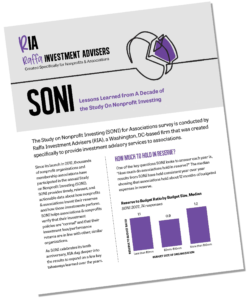We understand the challenges nonprofits and associations encounter
Learn about raffa & What makes us different
We’ve had a great relationship with Raffa Investment Advisors for nearly five years. Their nonprofit experience and the qualifications of their advisors have allowed us to align investment strategy with our mission. The education they provide has been of great benefit o both our Board of Directors and Finance Committee. Raffa’s client communication is timely and on-target and the quality of reporting is always high.
We’ve been with Raffa Investment Advisers for over ten years. Their communication skills, available, and responsiveness has been outstanding over the years. Our Management and Board Members trust and rely on their guidance. We highly recommend Raffa Investment Advisers and truly appreciate their expertise in helping us to meet our investment goals.
The Human Services Center is proud to call RIA our partner and we have entrusted their outstanding team with our assets since 2017. Our aspect that has separated them both in the competitive bid process and in our experience to date was and is their exceptional communication, availability, and responsiveness. The personal approach of their team with market reports, as well as catering our monthly reporting to our agency’s needs have made our relationship with RIA and rich experience.
Raffa has managed our personal investments for more than 10 years. We could not be happier working with and trusting this team. They are knowledgeable, responsive, and very pleasant. Having recently retired, they helped guide us through our retirement income questions, allocations, and perspectives on our next steps. The tools and resources they provide also helped us understand our overall strategy, including how to balance risk and expected returns.
Nonprofit Investing (SONI)
Launched in 2012, the annual Study on Nonprofit Investing (SONI) seeks to meet the need for timely, relevant, actionable data about how nonprofits invest their reserves and how their investments perform.
Now is your chance to answer the question—Are my organization’s investment reserves “normal”?
Nonprofits Deserve to Know









